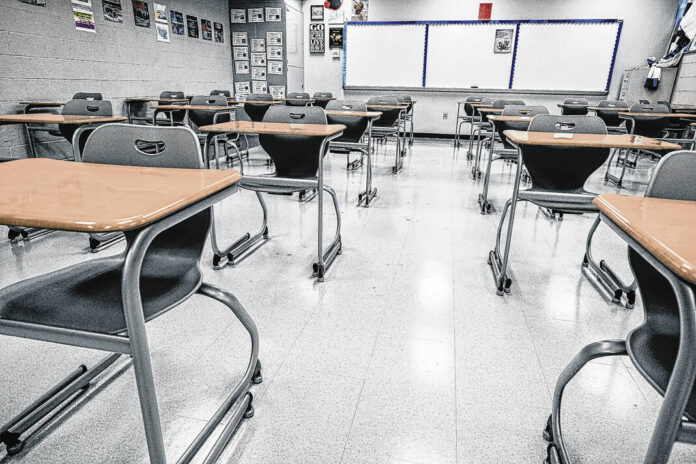
Mike Wolanin | The Republic Desks are shown in Katy Hubbard’s classroom at Columbus North High School in Columbus, Ind., Tuesday, July 28, 2020.
Mike Wolanin | The Republic Desks are shown in Katy Hubbard’s classroom at Columbus North High School in Columbus, Ind., Tuesday, July 28, 2020.
By Casey Smith | Indiana Capital Chronicle
For The Republic
INDIANAPOLIS — Scrambling to improve literacy rates among Hoosier students, state lawmakers seem adamant to toughen Indiana’s policy that requires most kids who are deficient in reading to repeat the third grade.
But the proposal has so far been met with skepticism from Hoosier teachers, school officials and education experts who maintain that a more stringent statewide retention law could further inflate classroom sizes and have negative social and emotional effects for students. Critics additionally caution that holding back more kids will cost the state hundreds of millions dollars more in education expenses.
The idea has so far been tossed around by Republican legislative leaders, who said the current state law isn’t being implemented effectively. The latest reading scores showed that one in five Hoosier third graders continue to struggle with foundational reading skills.
Indiana Gov. Eric Holcomb said he also working on a similar proposal, but hasn’t provided specific details.
Currently, Indiana third-graders who fail the statewide reading exam can be held back, although there are numerous exceptions, and deciding how to implement the state policy is ultimately left up to schools.
Indiana does not track third grade retention related to IREAD-3 testing, making it hard to quantify how many students are required to repeat the third grade specifically as a result of their inability to pass the exam.
No bills have been released yet, but drafts are expected when lawmakers reconvene for the 2024 legislative session Jan. 8. Indiana’s State Board of Education is expected to discuss retention at its monthly meeting, scheduled for Tuesday.

“If the approach is to make retention truly mandatory … that means you’re going to hold back kids that have known disabilities, where they may be making progress, but it’s slow. You’re going to have students that it just takes a lot of time and effort for them to learn — they can learn, but it’s not going to look like a majority of kids. And you’ve also got students who are brand new English speakers — any rational person can easily guess that they’re not going to pass (standardized testing),” said Fortville Elementary School principal Vincent Edwards.
“Are we going to retain those students in third grade indefinitely? What’s the approach there when we know all of these other factors?” he added. “That’s what scares me about the broad, state-level policy on mandated retention — you’re removing so much of the important decision making from the professionals who know those kids are the best.”
How retention started
Most states require students to take standardized tests that measure progress in reading and math in the third grade. Concerns over pandemic learning losses led some states to suspend such retentions, but now that schools are back to in-person learning, the controversy over whether to hold kids back has heated up in state legislatures across the country.
Indiana’s third grade reading policy dates back to a 2010 law passed by the General Assembly.
Then-Gov. Mitch Daniels and state superintendent Tony Bennett asked the legislature to pass a law requiring schools to retain third-graders if they didn’t pass a statewide standardized test, called IREAD-3.
Lawmakers declined to do so, however. Instead, House Act 1367 tasked the Indiana Department of Education (IDOE) with implementing a plan for teaching kids to read by third grade, with retention “as a last resort” and in “appropriate consultation with parents or guardians.” Mandatory retention for third graders who don’t pass IREAD-3 was not clearly stated in the 2010 statute.
Even so, in early 2012, the State Board of Education created an administrative rule — with the force of law — which mandates that kids who failed the third-grade literacy test should be held back.
Exceptions were carved out for students in special education, certain English language learners and students who have already been retained twice or more.
Lawmakers from both sides of the aisle later said that mandatory retention wasn’t what they wanted. Bennett’s successor, Glenda Ritz, tried in 2013 to get rid of the rule but was unsuccessful.
Still, it’s possible for a child who fails to pass IREAD-3 to “socially” move on to fourth grade.
Guidance from the IDOE says decisions about retention should be made on the basis of “the overall academic performance of the student in all subject areas.” The state agency adds that students who are promoted without passing IREAD-3 “must continue to receive third grade reading instruction during the subsequent school year” and until they pass the test or get an exception.
Research shows those instructions have since caused a lack of consistent retention practices among schools across Indiana.
Does repeating third grade help?
In 2023, 81.9% of Indiana’s third-graders were proficient in reading, according to IREAD-3 test results. The dismal literacy rates were slightly improved from the year prior but are still notably lower than a decade ago, when proficiency rates were 91.4%.
State literacy exam scores have been on the decline since 2015 but bottomed out during the COVID-19 pandemic, when pass rates dropped six percentage points to 81.2%.
On the National Assessment of Educational Progress, which allows for state-by-state comparisons, Indiana’s fourth-grade reading scores have been consistently above average, but not by much.
Research about the effectiveness of third grade retention varies and often shows marginal literacy improvements among students that have been held back.
IDOE spokesperson Molly Williams told the Indiana Capital Chronicle that retention “is a complex decision and there is often not a single reason why a student was retained.”
Research completed by Edwards, who completed his doctoral dissertation at Ball State University in 2021, estimates that — based on an analysis of IREAD-3 data — an average of 5.2% of Indiana third-graders could have been held back each year, between 2012 and 2019, due to the IREAD-3 policy. That’s equal to more than 4,000 students that could have been retained every year, although fewer than that actually ended up repeating third grade, he said.
Edwards’ research suggests “a slight positive effect” for students who are retained. He told the Capital Chronicle “we can’t be sure, though, because it’s complex,” and held that “the data just is not there” to support retention.
“I truly don’t see that there’s a basis for a strong statewide mandatory retention policy. Because on those types of broad policies, you really want to target the really big bang-for-your-buck things — the things that we feel certain about and there’s strong evidence and research for. Those of your statewide policies that you want to go after,” he said, pointing to policies that support before and after school supplemental tutoring, or literacy interventions delivered through small group settings during the school day, for example.
Edwards said most schools, including his own, already have some sort of system in place to identify — “as early as possible” — kids who are struggling with literacy, which he maintained are more likely to benefit students.
Retention, on the other hand, “comes with costs to individual students and to society at large,” Edwards noted: “There’s a research base that shows retention is correlated with increased behavioral issues, higher risk for mental illness, increase of dropping out of school. There are so many negative areas.”
In 2021, the nonprofit education advocacy group Education Trust called grade retention “an inequitable and ineffective response to unfinished learning” with negative social and emotional outcomes. It cited findings in various research that students who are retained are more likely to bully others or be bullied, that their parents have lower expectations, and that they earn less after high school. Multiple studies indicate that Black and Latino students are disproportionately held back.
A 2017 National Institutes of Health study found that while holding a third grader back may help that student catch up in reading, it also “increases the odds that a student will drop out of school before obtaining a high school diploma.”
Before getting serious about changing Indiana’s law, Edwards said lawmakers need to study retention more thoroughly. Specific, statewide data on current third grade retention will also be critical, he said.
“If we’re going to do a policy-level grade retention, then we should have some really strong academic benefits to counteract the risks that we’re taking on — the social emotional side, the additional financial costs to school districts — all of those negative effects,” Edwards continued. “Is it worth all of those negatives to go after a policy like this, for what is at best, a marginal positive?”
A separate study published in October followed Indiana third-graders for five years starting in 2012. During that period, less than 2% of all Hoosier kids repeated third grade — due in part to leniency in current state law that allows students to retake the reading test and attend intensive summer programs before requiring them to repeat the grade.
The study’s authors said that kept Indiana’s retention rate “significantly” lower than in other states, where retention rates range from 3% to more than 20%.
Researchers found retained students made significant literacy gains in fourth grade and were still somewhat ahead in seventh grade. The study didn’t continue through high school, though.

Hardy Murphy, a professor at Indiana University Indianapolis’ School of Education, emphasized that third grade is the pivot point for reading, marking the break point between learning to read and reading to learn, which usually begins to happen in the fourth grade.
He doubled down that “there’s enough research out there suggesting (retention) does not deliver in the long run.”
“You have to put yourself into the shoes of a child who’s watching their friends move on, and then they become someone that the system has to deal with differently. It could be devastating for a child,” he said, adding that a mandatory retention law would disproportionately impact students of color.
IREAD-3 data shows that only 65.6% of Black students and 68.9% of Hispanic students in 2023 passed the multiple-choice IREAD exam in 2023. About 64% of English language learners had passing scores, according to the latest results.
“I believe that people who are making these decisions are trying to do it for the best interest of children, because they don’t want students to finish school and not be prepared to live a constructive life. But I do think it’s the wrong thing to do,” Murphy said.
Like Edwards, Murphy said early interventions are more likely to help get students on track. He said the state legislature should instead create a bipartisan commission to evaluate current retention practices in Indiana and make recommendations to lawmakers about what should be done to improve literacy.
Other states react
At least 17 states and the District of Columbia require third graders to repeat the year if they don’t meet certain test scores, although many — including Indiana — have “good cause” exemptions for students who are just learning English or who perform well on alternative evaluations, according to the Education Commission of the States, a nonprofit organization that tracks state education policies.
The controversy over retention has led some states to lax retention policies or make grade repetition a last resort, however. As a part of those efforts, a number of states now require some or all of the following before making a student repeat a grade:
- Use of evidence-based reading programs, including phonics and multisensory instruction
- Notices to parents as soon as a school becomes aware of a child’s reading issues
- Outreach to families to engage parents in helping kids learn to read
Some states have also added early screening, early intervention and extra services to help young kids read, which advocates say give parents more opportunities to help their kids learn to read well before retention becomes an issue.
Earlier this year, Michigan enacted a law to end the retention of third graders, no matter their score on a standardized reading test. Instead, Michigan schools will employ interventions including tutoring, extra instruction and enrichment to help those students improve. The change came after a study showed a disproportionate number of minority and economically disadvantaged students were receiving low scores, leading critics to charge that the retentions were discriminatory.
Tennessee, in a different move, modified — but didn’t eliminate — its third-grade retention requirement in response to parents who complained that too many kids would be held back. Schools can now consider another test when determining retention, provide state-funded tutors for kids with reading deficiencies and track summer school and retention data.
Lawmakers in the Volunteer State are now additionally considering a similar strategy for fourth-graders, including a plan to advance if they continue to test poorly.
What could happen next
House Speaker Todd Huston and Senate President Pro Tempore Rodric Bray each said last month that their caucuses will focus on addressing literacy in the 2024 legislative session — specifically by addressing Indiana’s third grade retention law.
Huston suggested that exceptions in the current law have been misused, and said he wants policy changes to help Indiana to lead the nation in reading proficiency.
“There have been exceptions created and the exceptions have gotten broader and broader and broader,” he said.
Still, the house speaker emphasized that Indiana’s goal shouldn’t be to hold back kids — rather, it’s to ensure that they’ve learned to read by the time they reach fourth grade.
“Passing them along is a terrible disservice to the student,” Huston said.
But ISTA president Keith Gambill cautioned lawmakers last week, saying an increase in the number of retained students could create a bottleneck at third grade, meaning schools could struggle to staff enough teachers. Large class sizes also have negative effects on students.
“We support efforts to make sure that we’re doing all we can to have students reading on grade level,” Gambill said, but noted that — rather than holding more students back — the state should boost its investments in reading supports for first and second graders.
Gambill also pointed out that Indiana is one of just a few states where the mandatory beginning age for school isn’t until age seven. ISTA has long advocated for Indiana to change that to the age of five. The union leader additionally held that mandatory kindergarten and expanded pre-K options could boost early literacy. Gambill said, too, that more social and emotional resources are needed to help students who have struggled to adjust to school post-COVID.
“We know that through the pandemic, different things were a part of students’ lives when they were first brought into reading instruction … we also know that we have got to be looking at class size, especially in kindergarten, first and second grade,” he said. “We can’t just hope that we can put 29 or 32 first graders in a classroom and believe that the outcomes are going to be the same for schools that are able to staff at a class size of 18 to 20.”

Bray acknowledged that dilemma, especially in the first year after implementation of such a law, but said schools could move their teachers and classrooms around to adjust.
“There may be some opportunities for waivers under the right circumstance, but it seems like an awful lot of kids are getting into fourth grade and then we’re not keeping an eye on them to make sure that they do later become proficient,” Bray said.
“Will it make some parents mad? Yeah, I suppose so,” Bray, R-Martinsville, continued. “But they need to be vested in their child’s education … so we hope that they’ll be partners with us.”
Holcomb told reporters last week he’s “inclined to be aligned” with lawmakers on the notion that too many underprepared third-graders are advancing to fourth grade. He said his 2024 legislative agenda will include recommendations for policy around third grade literacy.
“We can’t afford business as usual,” the governor said. “Now, you have to get it right. There are some exceptions, but those may have been applied too liberally.”
The promise to address third grade retention comes on the heels of other landmark literacy laws passed in the previous session, including those mandating curriculum and teacher training based in the science of reading, and forbidding instruction that uses models like “three-cueing.”
While supportive of the new law, Gambill said the science of reading mandate “is a massive change” for educators, and that more tie is needed for that type of reading instruction to take hold.
“Hopefully (the 2024 session) will be a time when we’re able to be reflective of what we’ve put into place, to take a moment to see if what we’ve done is working — and if it isn’t — determine what adjustments we can make without doing whole-scale changes or new regulations,” Gambill said.
Edwards estimated that a statewide mandate that requires even 10% of all third-graders to be retained would affect approximately 80,000 kids. Assuming an average cost of $13,200 per year, per student, at a Hoosier public school, a stricter law could cost taxpayers another $105.6 million each year.
Asked how the move would impact school budgets, Huston countered, “How does it affect kids?”
“(Lawmakers will) figure out the budget thing, but we are doing those kids a total disservice,” he added. “We’ll have to figure (it) out because if it’s gonna cost us more money, we should pay more money.”
— The Indiana Capital Chronicle covers the state legislature and state government. For more, visit indianacapitalchronicle.com.




